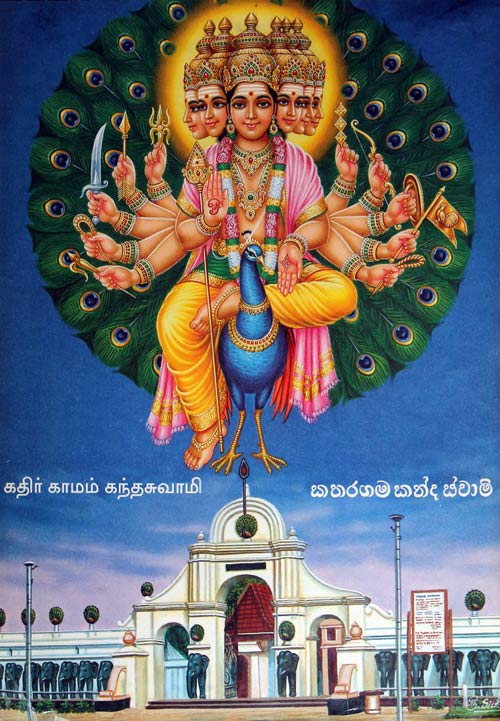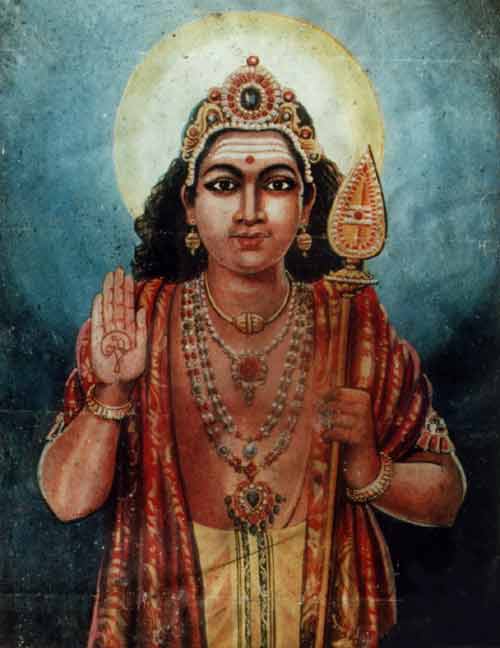|
| |||||
War-god under Siege(Rambles of an un-adventurous karā)
Colombo: The Island of Saturday 23rd March 1991Part IIBumping and swaying in the trailer of the three-wheeled hand tractor I taste dust on my dry lips. Yet, I feel justified in rejecting my two German companions' idea of a bicycle joyride to the ganja plantation. In less than ten minutes we have done most of the four miles from Kataragama township (if it is only four miles to the turn-off, as our guide, Podi Guney, claims), which is the kind of speed one wants when visiting an illicit production area to buy dope wholesale. Bicycles would only have been slower and the return journey hotter in the mid-morning sun. I reflect as we rattle along. Ruth and Elizabeth clutch their knapsacks and peer ahead as the young driver, not missing a word of his chatter with Podi sitting next to him, swings into a straight stretch of the undulating gravel roadway which runs through the jungle from Lord Skanda's ancient love nest to the remote stone habitat of the ascetics at Situlpahuva. We pass a farmstead carved out of the thorn scrub jungle flanking the road and Podi yells over the roar of the tractor, "Dang langai. I told you we could do it fast." A few more bends and the tractor turns into a narrow track and we cling for dear life because it is only a rough cart track not adequately leveled. After much twisting between the trees under the green canopy of the jungle, we stop and disembark. After the noise of the tractor, there is only the eerie quiet of the wilderness as we set off on foot along a track under the trees. Shortly after rounding some large boulders the tractor driver branches off on another track to find the plantation owner. Several minutes of pushing through the underbrush and, suddenly, we are in the middle of a small clump of bushes. Swami"This is local ganja — not so good. Let's go further." Podi Guney does not stop but skirts round the tall, spindly cannabis plants, and we follow, the two German travelers exclaiming with interest at their first sight of a ganja plantation. They had expected a 'plantation' in the conventional sense and not these clumps of, at most, a dozen plants craftily interspersed amongst the taller jungle vegetation. "To avoid detection from the air," I explain as we follow the stocky Podi through the jungle and reach another small clump of cannabis plants. "These plants of ganja originally came from Kerala and are really good 'grass'. You should buy this stuff." Podi Guney squats under a large tree and, unwrapping the red cloth covering his head, wipes the sweat from his face. "We wait here for the owner." Ruth and Elizabeth have barely begun to admire the delicate, five-pointed, spiky leaves of the ganja plants when we hear a call and the young tractor driver emerges from the other side of the ganja plot followed by a typically lanky, weather-beaten, Dry Zone farmer. The farmer, obviously a grizzled veteran of nefarious activity, is overjoyed that two suddas had come to see his plantation and, would have gladly given a guided tour plus botanical instruction. But I am in a hurry and cutting short the small talk I negotiate the purchase. Ever since I discovered last night that Swami Candananda intended the foreign women to carry a load of ganja back to Colombo for him, I have only anxious to finish the transaction and depart for Colombo before any 'heat' comes our way. I am furious with the swami for not warning me about this plan when inviting me in join their expedition to Kataragama. It had been those policemen tailing me in the kovil area last evening that promoted me to question the swami Rasthi?We follow the farmer along another jungle track to a small mud hut under the trees which stocks the harvested ganja. My impatient nagging does not give my companions much time to sniff the various kinds of ganja or to make a careful choice for their purchase. Both women's knapsacks stuffed full of the dope, we quickly head back to the tractor. Except for the shrill noise of the women's loud complaints about my refusal to immediately sample the psychedelic merchandise, the jungle remains a silent world in which we humans intrude. A watchful silence, I think, in my nervousness, reminded that we are in the domain of the yakshas. Going round the outcrop of large boulders we all stop in shock. The diminutive form of Rama Swami, the holiest of all Kataragama swamis, stands in our path, his saffron veti and shawl a vivid splash of colour against the monotonous greens of the jungle. Remaining quite still, leaning slightly on his wooden staff, the sprightly old swami gives us a kindly half-smile through his straggly grey-white beard. But the forest air is electric as we stare at this apparition. "Oya kattiya methanin yanna. Go quickly. Mey velāva honda nehe. Yanna, yanna! That is all. I go back to my meditations." Rama Swami turns and walks away into the forest. The two German women break our awed silence as the elderly swami is swiftly swallowed by the thick undergrowth, the tangled vegetation. "What did he say...? How did he get here?" "He is holy man. He has power to fly and to see far." Podi Guney may be a local karā but he is also a rustic son of Kataragama's mystery-laden, sacred soil. "The swami has warned us. Let's go quickly." Quite ready to believe the revered sannyasi, I hurry my chattering female companions along. As to Rama Swami's a powers — I know he has a bicycle and I also know that when we left his kutiya at dawn this morning none had thought it necessary to check whether the old ascetic had already left home. And the sharp-eyed swami would see far from the top of the rock outcrop. Whatever the swami has seen, his words have frightened the two local yokels. The tractor driver runs to the vehicle and violently swings it around. He is off even while I am yet scrambling aboard the trailer. We bump along the track and, emerging from the jungle, swerve onto the Kataragama road and race down it. The noise and dust and, our exhaustion from that final dash prevent us from speaking as we cling to the sides of the bucking trailer. Suddenly Podi Guney points ahead and we see a dust cloud rising above the jungle in the distance. "Many vehicles are coming towards us," Podi yells and I translate to Ruth and Elizabeth. Ruth clutches my arm, her eyes worried. "Police...?" I nod mutely because of the noise. Elizabeth looks inquiringly at me and points to their ganja-packed knapsacks. I smile reassuringly and gesture to indicate that they are to remain calm and await developments. But I am far from calm. Podi, in front with the driver, is jabbering away with him. He turns to me and yells above the noise. "There is much dust. So it could be heavy vehicles of Police or Forces. But don't worry, with two suddis with us they won't take any notice." The dust clouds are now very close ahead and we tense in anticipation. ArmyThen we have rounded a bend and a police jeep races past us heading in the opposite direction. It is followed by another jeepload of cops and then, three big Army trucks thunder past one after the other. Steel-helmeted soldiers, looking far too young to be holding deadly assault rifles, look down at us curiously. At my urgent prompting the two suddis smile and wave at them in a friendly manner. The soldiers looking out of the back of the last truck wave back until they are lost in the dust cloud. We begin to relax but the large Tata Benz trucks are followed by another Police jeep which slows down and the Inspector in front peers at us suspiciously. Then the jeep is gone behind the rest of the deadly convoy, and we slowly begin to let our breath out. We race on, and now, the silence is a somber one. The jungle thins out into chenas and uncultivated paddy fields. But there are no people to be seen, although it is now past mid-morning. The roadside huts seem empty — abandoned? Podi turns around from the jerking front seat and eyes us grimly. "The people have left their houses and moved away from the road into the jungle because of the Forces. You cannot say what could happen. If there is any shooting many innocent people could get killed. Also if the Forces are angry, they need to kill." As we pass through an empty, foreign land, the abandoned dwelling ominous in their silence, we have no reply to those chilling remarking. I hope that my two foreign companions have given up all ideas of sampling the dope till we get out of Kataragama and back to civilisation. When we reach the kutiya Swami Chandananda is waiting. The women are full of their experiences but I am ready to move out, so I tell him of Rama Swami's warning. Podi Guney has departed with the tractor. I think he is anxious to distance himself from us and dangerous cargo. Chandananda agrees with me, his eyes twinkling and full beard hiding a sardonic half-smile. Kataragama"As you see, the time is not good in Kataragama. When the people are greedy and ignorant and abuse and misuse the favours of the gods, the gods are angry. When Lord Skanda gets angry..." Chandananda looks at me seriously and then out across the fields to the spire of the Kiri Vehera jutting out of the trees in the distance, and sights. "When the war-god gets angry, it is a terrible time." Sitting in the bus at Kataragama bus stand later in the day, waiting for it to start for Colombo, I am sick with tension. The hurried departure has added to the tension together with the knowledge of our illegal cargo. Ruth, sitting next to me, her thigh pressed against mine in some effort at erotic reassurance, is only a reminder of the dangers. And, after that ride through a sunlit and fertile but forsaken landscape, these dangers are only a reminder of worse, if unseen, violence. Nor only in Kataragama. We escape not to a haven of peace, I realise. With bombs even in the Oberoi the war-god's anger is truly terrible. by Rasthivadu Part I of "War-god under Siege"
|

